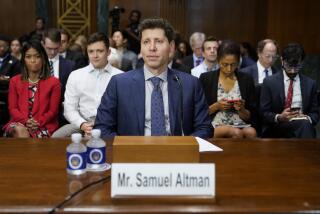Way Cleared to Import Digital Audio Tapes
- Share via
Results of an eight-month $150,000 study, released Tuesday in Washington, clear the way for importing the controversial high-quality digital audio tape (DAT) system into the United States.
The study was heralded by audio manufacturers but condemned by the recording industry, which fears widespread home copying by consumers would cost it millions of dollars in revenue. The record industry asked Congress last year to require all DAT systems to carry an anti-copying device.
The engineering study of the taping system conducted by the National Bureau of Standards showed that a DAT anti-copying device can ruin the tape’s sound quality. The study also showed that the device could be easily bypassed by DAT system owners and, therefore, would be useless in preventing tape dubbing, even if it were installed in DAT recorders.
“We are, of course, disappointed in the National Bureau of Standards’ results, but we said we would stand by the results and of course we will,” said Trish Heimers, public relations director for the Recording Industry Assn. of America (RIAA), lobby for the nation’s six major record companies.
A “copy code,” as it was called by the RIAA, was to be included on all prerecorded cassettes, compact discs or record albums sold in the U.S. The copy code would be “read” by the system’s anti-copying device; once such a code was “read,” the DAT system would shut down.
But the Home Recording Rights Coalition, funded chiefly by manufacturers of DAT systems, objected that the copy code system, as it was originally devised by CBS Records, would damage DAT sound quality.
“We’ve been fighting for the past five years with the recording industry people, arguing that there isn’t any harm in home recording,” said former Federal Communication Commission Chairman Charles Ferris, attorney for the coalition. “So the idea that their best remedy (to home recording) was shot down was a major triumph, I suppose. Now they’ll be able to import it and I’ll be able to have one in my home.”
DAT, which has been available for a year in Japan where it was first developed in the early 1980s, has not yet been imported in large numbers to the U.S. A DAT recorder retails for about $1,500 in Tokyo.
Marantz proposed importing the tape system for retail sales in the U.S. last fall but put off its plans until the copy code controversy could be resolved.
“(RIAA President Jay) Berman said today that if the manufacturers begin importing before a solution is reached, he is prepared to sue them,” said the association’s Heimers. “The threat of DAT still exists and the home taping problem still exists, so our desire is to find a solution that is satisfactory to both sides.”
Gary Shapiro, a spokesman for the Electronics Industry Assn., said, “I don’t think there’s much basis for a threat of a lawsuit. I think it’s more of a scare tactic.”
Ferris called the recording industry association fears “absurd.”
“All I can say is that I’m thankful that Sony did not submit to that kind of a threat when it brought the first VCR into this country back in the mid-1970s,” Ferris said. “The case is closed in my opinion with respect to the copyright laws.”
He said he had heard of no timetable for the beginning of DAT imports but expected the units to begin selling here soon, though the fluctuating dollar could make the already-expensive system prohibitive for most U.S. consumers.
DAT is generally regarded by audiophiles and engineers alike to be the highest-quality tape recording device yet developed. Tapes can be dubbed on a DAT tape deck with virtually no loss of fidelity, sparking fears in the recording industry that music could be endlessly duplicated without recording artists, producers or songwriters receiving just compensation.
“What we desire most of all is a meeting with the hardware manufacturers because, after all, they know their machines best,” said the RIAA’S Heimers. “We could work with them for the best possible solution, but we will continue to press for legislation that will help us to protect our copyrights.”
She said that the association had agreed last summer to abide by the findings of the National Bureau of Standards and would not challenge them. The RIAA and the Home Recording Rights Coalition each put up $75,000 last July and asked the National Bureau of Standards to answer three questions:
--Does the copy prevention system achieve its purpose of preventing DAT machines from recording?
--Does the system diminish the quality of prerecorded material?
--Can the system be bypassed, and, if so, how easily?
According to the three-page “executive summary” of the NBS findings, the copy-prevention system only worked about half the time. NBS engineers also came up with five different ways to circumvent the anti-copying system. According to their findings, a simple device can be built to circumvent the system for about $100.
Eric Lichtblau in Washington contributed to this story.
More to Read
The biggest entertainment stories
Get our big stories about Hollywood, film, television, music, arts, culture and more right in your inbox as soon as they publish.
You may occasionally receive promotional content from the Los Angeles Times.










